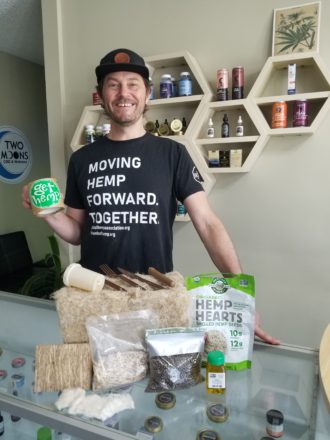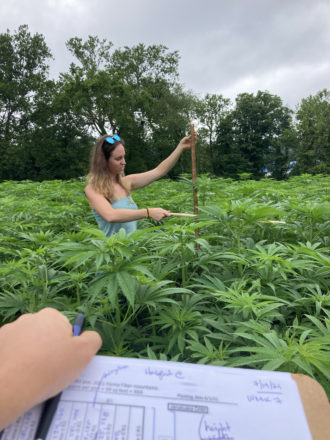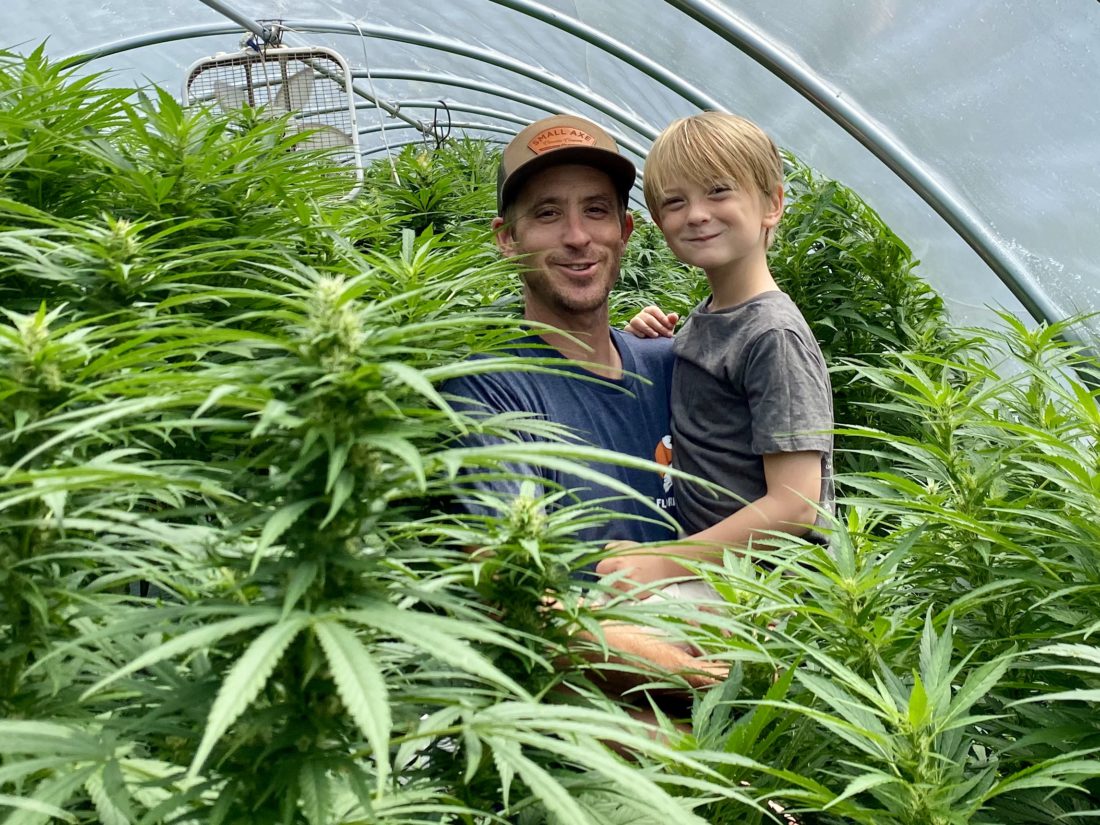“What’s great about hemp? There’s 25,000 different uses for it,” says Drew Kitt. He’s come prepared to prove the point: On a glass case at Two Moons CBD and Wellness, the Arden store he founded and co-owns with his wife, Jesse Kitt, he lays out sample after sample of products made using the plant.
There’s a set of shiny brown utensils made from hemp-based plastic. A bag of shelled hemp seeds invites curious eaters to try them as a yogurt or smoothie topping. A tuft of off-white, slightly scratchy hemp fibers sits ready to be woven into fabric for all manner of clothing. Kitt himself wears a hemp-based hat, shirt and sneakers; he connects growers across the globe with hemp seeds for fiber and grain in his other job as director of business development for the International Hemp Exchange.
When North Carolina legalized the cultivation of industrial hemp (defined as varieties of cannabis, the same plant as marijuana, that contain less than 0.3% by dry weight of the intoxicating chemical THC) in 2015, state officials had a similar range of uses in mind. Senate Bill 313 listed hemp products as “including, but not limited to, cloth, cordage, fiber, food, fuel, paint, paper, particleboard, plastics, seed, seed meal and seed oil for consumption.”
The state law didn’t name smokable hemp, tinctures, edible gummies or skin care salves. But once Kitt clears away the samples, those offerings are what dominate his store’s displays. Whether they feature nonpsychoactive CBD or legal intoxicants such as delta-8 THC, the products at Two Moons are all derived from one part of the plant — the flower — and used for wellness or recreation.
That specific segment of the market predominantly is Western North Carolina’s hemp industry, says Margaret Bloomquist. A research associate at NC State University’s Mountain Horticultural Crops Research and Extension Center in Mills River, she’s been working with local farmers since the state’s first legal hemp was planted in 2017.

“High-quality floral hemp, primarily for cannabinoid extraction,” Bloomquist says, is where those farmers are focusing. A small collection of local processors and makers adds value to the raw product, and retailers like the Kitts provide distribution.
It’s a modest market. Although WNC-specific figures aren’t available, the U.S. Department of Agriculture reports that the total realized value of floral hemp in North Carolina was about $15.5 million in 2021. For the purpose of scale, lodging revenues in Buncombe County alone for the same year exceeded $465 million.
Could the versatility of hemp eventually translate into a greater economic impact for the region? Xpress examined the path of the plant thus far and its prospects for future growth in WNC.
Highs and lows
Fewer than 100 North Carolina farmers were licensed to raise hemp for the initial 2017 growing season, according to Marne Coit, a former professor of agricultural law at NC State who now advises cannabis-sector businesses through Cary-based Coit Consulting LLC. Interest quickly grew, and by the end of 2019, about 1,500 growers had their licenses.
But as of mid-March this year, the number of active North Carolina hemp licenses listed by the USDA’s Agricultural Marketing Service stood at just under 500. Coit says many farmers quit growing the crop after the initial excitement over hemp led to a glut of production far in excess of demand.
“For the first few years of the program here, I would say more than 96% of growers were growing for CBD. In the fall of 2019, there was a glut of hemp on the market, almost all of it grown for CBD. But it wasn’t just happening in North Carolina — it was happening across the country,” Coit explains. “Prices dropped, and we saw processors going out of business.”
WNC followed that statewide trend, says Charles Zink, executive director for the Madison/Buncombe County office of the USDA’s Farm Service Agency. In 2019, he recalls driving around rural areas and seeing open fields of hemp. By 2022, operations had scaled back to nine growers in Madison County and 25 in Buncombe, most of them small scale and growing in greenhouses or sheds.
The country produced so much hemp in 2019, says Kitt, that some processors are still using plant material and seed oil from that year in their products. He notes that a little hemp flower goes a long way: Gesturing around his well-stocked shop, he says everything in sight could be made from a plot of hemp about the size of the room itself, maybe 400 square feet.
“It’s less expensive just to go and buy [extracted CBD and other hemp-derived chemicals] than it is to farm,” Kitt says of the inputs for manufacturers. “It’s upside-down.”
Craft cannabis
Despite these economic headwinds, some local farmers continue to find success with floral hemp. Andrew Wheeler has grown the crop since 2019 at Arrowhead Hemp Farms, a 1-acre operation near Turkey Creek in Leicester. He says farming and marketing the farm’s products is his full-time job.
As one of the region’s only USDA-certified organic hemp growers, Wheeler says, Arrowhead is able to command higher prices for its full-spectrum CBD oil and associated products. What he can’t sell through his own brand, he offers as raw material on an unbranded, “white-label” basis to other producers who want to brand their own lines as organic. That includes Asheville’s Small Axe Cannabis Co., which focuses on delta-8 products that Arrowhead doesn’t make.
Wheeler says he’s seen other local growers overinvest in hemp, then leave the market when price fluctuations started challenging their bottom line. He says a deliberate, sustainable strategy for growth, a premium-quality product and a passion for hemp’s potential to improve lives have helped Arrowhead stay the course.
“I would do this if there was no market. I really enjoy growing the plant. I really like the feedback from people,” Wheeler says. “It’s been super interesting how it’s opened up a different generation to cannabis that was kind of closed-minded to it before. A large part of our demographic is over 60.”
Kitt says Wheeler’s approach is emblematic of the WNC hemp market. Similar to the craft beer industry that’s also worked in the mountains, Kitt explains, successful local producers make their money by formulating their own products, creating a strong brand and capturing all that value through direct consumer sales.
Yet, there’s a limit to how much locals can succeed beyond their regional boundaries. Kitt pulls out two small vials of CBD oil from behind the counter of his shop. The first, crafted by an Asheville maker, costs $60 for 1,000 milligrams. The second, produced by Oregon-based Lazarus Naturals, costs $40 for 1,500 milligrams — less than half as much on a per-weight basis.
If the Asheville producer tried to expand outside its loyal customer base in WNC, Kitt continues, it would be outgunned by companies like Lazarus. “They grow at scale, they’re vertically integrated, they’re a recognized brand,” he explains. “It’d be like saying Burial [Beer Co.] can compete with Sierra Nevada.”
Weaving a market
Kitt argues that similar dynamics make it challenging for local producers to break into the more industrial side of the hemp economy. If WNC farmers with modest mountain plots wanted to grow hemp for grain or fiber, they’d be going up against established growers with hundreds of acres on the plains of Montana, the country’s leading hemp producer for both uses.
Bloomquist, the NC State researcher, sees things differently. From an agricultural perspective, she says, hemp is well suited to the region. And while scientists are still working to breed industrial hemp varieties for the U.S., Chinese cultivars developed for fiber production at similar latitudes have been strong performers in WNC.

“It’s a valid point that we have small land holdings and can’t compete with huge flatland acreages,” acknowledges Bloomquist. “But we have awesome growers, and we really pride ourselves on niche markets, quality over quantity and creative marketing.”
NC State scientists are working to open up potentially lucrative niches, Bloomquist continues, by exploring different ways of processing hemp fiber. One project in collaboration with the university’s Department of Forest Biomaterials seeks to create a hemp-based alternative to the plastic row cover many farmers use for weed control.
To realize that value, however, local farmers need local processing facilities, and North Carolina is lagging on that front. Any current fiber processors in WNC, says Bloomquist, are “small scale and others that are interested in R&D.” The biggest hemp fiber processing plant announced for the state so far is being built by BIOPHIL Natural Fibers in Lumberton, a four-hour drive from Asheville.
“It’s a chicken-and-egg kind of thing,” explains Bloomquist. Companies don’t want to build expensive plants unless they know they’ll have raw materials to process, and farmers don’t want to grow an untested crop unless they know they’ll have a profitable market.
That includes Wheeler. He hasn’t considered growing hemp for fiber, given its uncertain return and the cost of shipping to far-off processors. “We would need localized processing, and then you probably could create a localized economy around it,” he says.
Awaiting medical marijuana
Not everyone involved in WNC’s hemp economy entered the market with plans to keep growing or selling the crop long term.
“Most people that got into the hemp market early here — I would say upward of 90% — were just putting training wheels on their business in the thought that they were going to be able to add medical or recreational cannabis to their business models once it was legalized in North Carolina,” says Nicolette Baglio. She’s the owner of Asheville hemp-based wellness brand Citizen Bloom Botanics and has closely followed the development of hemp and marijuana legislation at the General Assembly.
North Carolina is now moving closer to legalized medical marijuana. Senate Bill 3, which would approve the plant as treatment for a limited number of “debilitating medical conditions” such as cancer and multiple sclerosis, passed the chamber with bipartisan support March 1. The bill is currently sitting in a House committee and hasn’t been scheduled for another vote.
But Baglio believes that SB3 isn’t likely to give local hemp businesses the marijuana opportunities they’ve been waiting for. The bill would authorize only 10 companies to provide medical cannabis, and each would have to be vertically integrated, handling its entire supply chain from farm to dispensary. Baglio says those requirements, as well as the $50,000 license fee required of each provider, favor large corporations over WNC’s homegrown enterprises.
“Our bill is so restrictive that they are not going to be able to enter this new market at all,” Baglio says. “I think many of them may close because there’s no opportunity for them to grow into that market.”
Baglio also fears that the approval of medical marijuana could undermine the state’s current market for legal, hemp-derived intoxicants like delta-8 and THCA. Other states with medical cannabis programs, such as Arkansas and Florida, are considering legislation to severely limit or ban those chemicals, ostensibly on public health grounds.
For now, such laws don’t seem to be in development at the General Assembly. Sen. Julie Mayfield, a Buncombe County Democrat who has been involved in negotiations over the state’s medical marijuana bill, tells Xpress that her colleagues have shown “zero appetite” to discuss regulations on intoxicating hemp products.
Hemmed in by hemp rules
Asked what regulatory changes would most benefit the local hemp economy, Wheeler of Arrowhead Hemp Farms says he’d just like clarity from the federal government about what is and isn’t allowed. “These are all community, family businesses and farms,” he says. “We’re looking for long-term stability.”
Coit, the agricultural law expert, agrees that the complex legal landscape around hemp — as well as its fraught associations with cannabis — has hampered its economic growth. She points to federal licensing rules that require all hemp growers to undergo fingerprinting and a criminal background check, mandates that she says can discourage farmers from pursuing the crop.
“It says in the 2018 federal farm bill that hemp is to be treated like any other crop. There’s no other crop that I know of where you need to be fingerprinted in order to grow it,” Coit points out. She’s consulting for Agricultural Hemp Solutions, a Portland, Ore.-based lobbying group that seeks to carve out an exemption from those rules for growers of grain or fiber hemp.
The strict limit on THC incidentally present in industrial hemp also can create a burden for farmers. Any crop that ends up with more than 0.3% of the chemical by weight (much lower than the 17%-28% found in commercially popular marijuana strains) must be destroyed. Coit says as much as 10% of North Carolina’s industrial hemp is lost due to this restriction, and some industry groups want to see the THC limit raised to 1%.
“We’ve burned big piles of stuff,” says Bloomquist with NC State. “And having to do it on a grower’s farm is really awful because it’s their livelihood, too.”
As growers, processors and legislators continue to hash out the future of hemp, Bloomquist remains optimistic about the plant. It’s adaptable to WNC’s changing climate, fits into crop rotation practices and grows, well, like a weed.
“Hemp and cannabis are amazing crops to grow,” she says. “I think we can have successful growers in a lot of different areas.”




Before you comment
The comments section is here to provide a platform for civil dialogue on the issues we face together as a local community. Xpress is committed to offering this platform for all voices, but when the tone of the discussion gets nasty or strays off topic, we believe many people choose not to participate. Xpress editors are determined to moderate comments to ensure a constructive interchange is maintained. All comments judged not to be in keeping with the spirit of civil discourse will be removed and repeat violators will be banned. See here for our terms of service. Thank you for being part of this effort to promote respectful discussion.